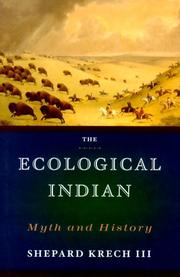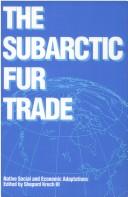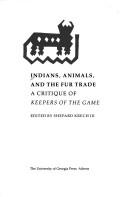| Listing 1 - 5 of 5 |
Sort by
|

ISBN: 0393047555 Year: 1999 Publisher: New York : W.W. Norton & Company,
Abstract | Keywords | Export | Availability | Bookmark
 Loading...
Loading...Choose an application
- Reference Manager
- EndNote
- RefWorks (Direct export to RefWorks)
Indian philosophy --- Indians of North America --- Human ecology --- Philosophy of nature --- Indians in popular culture --- Public opinion --- Public opinion. --- Philosophy. --- Philosophy

ISBN: 9780774803748 0774803746 9780774801867 0774801867 Year: 1990 Publisher: Vancouver: University of British Columbia press,
Abstract | Keywords | Export | Availability | Bookmark
 Loading...
Loading...Choose an application
- Reference Manager
- EndNote
- RefWorks (Direct export to RefWorks)
Fur trade --- Indians of North America --- Indians of North America

ISBN: 0820305634 Year: 1981 Publisher: Athens : University of Georgia Press,
Abstract | Keywords | Export | Availability | Bookmark
 Loading...
Loading...Choose an application
- Reference Manager
- EndNote
- RefWorks (Direct export to RefWorks)
Fur trade --- Indians of North America --- Micmac Indians --- Ojibwa Indians --- Fourrures --- Indiens d'Amérique --- Hunting --- Religion --- Commerce --- Martin, Calvin. --- Hunting.
Book
ISBN: 9786613225573 0774854235 1283225573 Year: 1984 Publisher: Vancouver : University of British Columbia Press,
Abstract | Keywords | Export | Availability | Bookmark
 Loading...
Loading...Choose an application
- Reference Manager
- EndNote
- RefWorks (Direct export to RefWorks)
Originally presented at the American Society for Ethnohistory conference in 1981, the papers in this book focus on themes which have been near the centre of fur trade scholarship: the identification of Indian motivations; the degree to which Indians were discriminating consumers and creative participants; and the extent of Native dependency on the trade. It spans the period from the seventeenth century up to and including the twentieth century. In one of the key essays, Arthur J. Ray questions the theory that modern Native welfare societies are of recent origin and traces their roots to the early fur trade. In developing his thesis, his concerns about resource depletions and other ecological changes, the advent of new mercantilistic impulses, and the development of dependence also emerge as sources of inquiry by the other authors. Papers by Charles A. Bishop, Toby Morantz, and Carol M. Judd focus on the North Algonquians in the eastern subarctic and earlier centuries of the trade, while two final essays by Shepard Krech, and Robert Jarvenpa and Hetty Jo Brumbach shift the focus to the North Athapascans in the western subarctic. The Subarctic Fur Trade will help scholars become more fully aware of the issues concerned with Native economic history, which are of common interest to scholars from many different disciplines. It also illustrates the methods that are increasingly being used to arrive at empirically based answers to questions and which will, when further refined, lead to greater advances in fur-trade scholarship.
Fur trade --- Indians of North America --- History --- Commerce --- Economic conditions
Book
ISBN: 0821444115 9780821444115 9780821419960 082141996X Year: 2012 Publisher: Athens, OH Ohio University Press
Abstract | Keywords | Export | Availability | Bookmark
 Loading...
Loading...Choose an application
- Reference Manager
- EndNote
- RefWorks (Direct export to RefWorks)
Indigenous knowledge has become a catchphrase in global struggles for environmental justice. Yet indigenous knowledges are often viewed, incorrectly, as pure and primordial cultural artifacts. This collection draws from African and North American cases to argue that the forms of knowledge identified as "indigenous" resulted from strategies to control environmental resources during and after colonial encounters. At times indigenous knowledges represented a "middle ground" of intellectual exchanges between colonizers and colonized; elsewhere, indigenous knowledges were defined through conflic
Traditional ecological knowledge --- Ethnoecology --- Indigenous ecological knowledge --- Indigenous environmental knowledge --- T.E.K. (Traditional ecological knowledge) --- TEK (Traditional ecological knowledge) --- Traditional environmental knowledge --- Ethnoscience --- Experiential learning --- Biopiracy --- Indigenous peoples --- Human ecology --- Ecology --- Aboriginal peoples --- Aborigines --- Adivasis --- Indigenous populations --- Native peoples --- Native races --- Ethnology
| Listing 1 - 5 of 5 |
Sort by
|

 Search
Search Feedback
Feedback About UniCat
About UniCat  Help
Help News
News